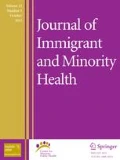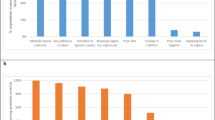Abstract
Background We conducted a focus group study to assess the influence of partner communication on breast and cervical cancer screening and the perceived existing and potential support from male partners in participating in cancer screening. Secondarily, Mexican male and female views on health care and cancer were explored. Methods Seven focus groups (two female-only, three male-only, and two couples) were conducted in Spanish. Results Findings suggest that knowledge about cervical cancer was significantly less than knowledge about breast cancer among both men and women. Barriers to cancer screening included language barriers, lack of health insurance, and lack of awareness of the need for screening. Male partners expressed willingness to support their female partners in cancer screening activities. Conclusion Cervical cancer education is desperately needed, including education on the availability of free and low cost screening services. Education efforts should include the male community members, especially as the males perceive themselves as responsible for the financial burden of care.
Similar content being viewed by others
References
US Census Bureau: American Community Survey 2004.
Thierren M, Ramirez RR. The Hispanic Population in the United States. US Census Bureau 2001 1.
New York City Department of Planning: The Newest New Yorker. New York City 2004 1.
Fernandez-Esquer ME, Cardenas-Turanzas M. Cervical cancer screening among Latinas recently immigrated to the United States. Prev Med. 2004;38:529–35. doi:10.1016/j.ypmed.2003.12.009.
Magai C, Consedine N, Conway F, Neugut A, Culver C. Diversity matters: unique populations of women and breast cancer screening. Cancer. 2004;100:2300–7. doi:10.1002/cncr.20278.
Maskarinec G, Noh JJ. The effect of migration on cancer incidence among Japanese in Hawaii. Ethn Dis. 2004;14:431–9.
Matin M, LeBaron S. Attitudes toward cervical cancer screening among Muslim women: a pilot study. Women Health. 2004;39:63–77. doi:10.1300/J013v39n03_05.
Seeff LC, McKenna MT. Cervical cancer mortality among foreign-born women living in the United States, 1985–1996. Cancer Detect Prev. 2003;27:203–8. doi:10.1016/S0361-090X(03)00062-X.
Lin S, Clarke C, O’Malley C, Le G. Studying cancer incidence and outcomes in immigrants: methodological concerns. Am J Public Health. 2002;92:1757–9.
Wingo PA, Ries LA, Giovino GA, Miller DS, Rosenberg HM, Shopland DR, et al. Annual report to the nation on the status of cancer, 1973–1996, with a special section on lung cancer and tobacco smoking. J Natl Cancer Inst. 1999;91:675–90. doi:10.1093/jnci/91.8.675.
Scarinci I, Beech B, Kivach K, Bailey T. An examination of sociocultural factors associated with cervical cancer screening among low-income Latina immigrants of reproductive age. J Immigr Health. 2003;5:119–28. doi:10.1023/A:1023939801991.
Centers for Disease Control: National Program of Cancer Registry, United States Cancer Statistics. View Data online. Retrieved on January 11, 2005 from: http://apps.nccd.cdc.gov/uscs.
Hernandez-Hernandez DM, Garcia-Elizondo MR, Ornelas-Bernal L, Hernandez-Aleman F, Gonzalez-Lira G, Martinez-Garcia MC. Factors associated with non-use of Pap test: a population survey. Arch Med Res. 1998;29:263–70.
Brown D, Fouad M, Basen K, Tortoler G. Recruitment and retention of minority women in cancer screening, prevention and treatment trial. Ann Epidemiol. 2000;10:S13–21. doi:10.1016/S1047-2797(00)00197-6.
Giuliano A, Mokuau N, Hughes C, Tortolero G, Risendal B, Ho RC, et al. Participation of minorities in cancer research: the influence of structural, cultural and linguistic factors. Ann Epidemiol. 2000;10:S22–34. doi:10.1016/S1047-2797(00)00195-2.
Hubbell FA, Chavez LR, Mishra SI, Magana JR, Burciaga-Valdez R. From ethnography to intervention: developing a breast cancer control program for Latinas. J Natl Cancer Inst Monogr. 1995;18:109–15.
Hunt LM, de Voogd KB, Akana LL, Browner CH. Abnormal Pap Screening among Mexican-American Women: Impediments to Receiving and Reporting Follow-up Care. Oncology Nursing Forum. 1998;25:1743–9.
Wu ZH, Black SA, Markides KS. Prevalence and associated factors of cancer screening: why are so many older Mexican-American women never screened? Prev Med. 2001;33:268–73. doi:10.1006/pmed.2001.0880.
Meana M, Terry B, Usha G, Wells LW, Rosser W. Older immigrant Tamil women and their doctors: attitudes toward breast cancer screening. J Immigr Health. 2001;3:5–13. doi:10.1023/A:1026654317094.
Davison C, Frankel S, Smith GD. The limits of lifestyle: reassessing fatalism in the popular culture of illness prevention. Soc Sci Med. 1992;34:675–85. doi:10.1016/0277-9536(92)90195-V.
Laws MB, Mayo SJ. The Latina Breast Cancer Control Study, year one: factors predicting screening mammography utilization by urban Latina women in Massachusetts. J Community Health. 1998;23:251–67. doi:10.1023/A:1018776704683.
Ramirez AG, Talavera GA, Villarreal R, Suarez L, McAlister A, Trapido E, et al. Breast cancer screening in regional Hispanic populations. Health Educ Res. 2000;15:559–68. doi:10.1093/her/15.5.559.
Suarez L, Lloyd L, Weiss N, Pulley L. Effect of social networks on cancer screening behavior of older Mexican-American women. J Natl Cancer Inst. 1994;86:775–9. doi:10.1093/jnci/86.10.775.
Berkman LF, Syme SL. Social networks, host resistance, and mortality: a 9-year follow-up study of Alameda County residents. Am J Epidemiol. 1979;109:186–204.
Navarro AM, Senn KI, McNicholas IJ, Kaplan RM, Roppe B, Campo MC. Por la Vida model enhances use of cancer screening tests among Latinas. Am J Prev Med. 1998;15:32–41. doi:10.1016/S0749-3797(98)00023-3.
Seal SW, Wagner-Raphael LI, Ehrhardt AA. Sex, intimacy, and HIV: an ethnographic study of a Puerto Rican social group in New York City. J Psychol Human Sex. 2000;11:51–92. doi:10.1300/J056v11n04_03.
Marin BV. Cultural issues in HIV prevention for Latinos: should we try to change gender roles? In: Oskamp S, Clare S, editors. Understanding and preventing HIV risk behavior. Safer sex and drug use. California: Sage Publications, Inc. 1996;157–76.
Soler H, Quadagno D, Sly DF, Riehman KS, Eberstein EW, Harrison DF. Relationship dynamics, ethnicity and condom use among low-income women. Fam Plann Perspect. 2000;32:82–9. doi:10.2307/2648216.
Balcazar H, Trier CM, Cobas JA. What predicts breastfeeding intention in Mexican-American and non-Hispanic white women? Evidence from a national survey. Birth. 1995;22:74–80. doi:10.1111/j.1523-536X.1995.tb00563.x.
Gorman T, Byrd TL, Vanderslice J. Breast-feeding practices, attitudes, and beliefs among Hispanic women and men in a border community. Fam Community Health. 1995;18:17–27.
Womeodu R, Bailey J. Barriers to cancer screening. Med Clin North Am. 1996;80:115–33. doi:10.1016/S0025-7125(05)70430-2.
Winkler J, Bingham A, Coffey P, Handwerker WP. Women’s participation in cervical cancer screening program in northern Peru. Health Educ Res Theory Pract. 2007;23(1):10–24.
Flores ET, Mata AG. Latino male attitudes and behaviors on their spouses’ and partners’ cancer-screening behavior: Focus group findings. J Natl Cancer Inst Monogr. 1995;18:87–93.
Krueger R. Focus groups: a practical guide for applied research. 2nd ed. California: Sage Publications; 1994.
Freeman HP, Wingrove BK, editors. Excess cervical cancer mortality: a marker for low access to health care in poor communities. Rockville, MD: National Cancer Institute, Center to Reduce Cancer Health Disparities, National Institute of Health; 2005 (Publication No. 05–5282).
Remennick L. The challenge of early breast cancer detection among immigrant and minority women in multicultural societies. Breast J. 2006;12:S103–10. doi:10.1111/j.1075-122X.2006.00204.x.
Acknowledgements
This study was funded by NIH/NCI Grant # UO1 CA86286. We would also like to acknowledge the contributions of Javier Gonzalez and Monica Cebrian, who facilitated the focus groups, and translated the transcripts, and the tireless efforts of Associacion Tepeyac de New York, YWCA/Encore Plus and Project Reach Youth, who recruited the focus group participants, aided by the efforts of Amarilis Cespedes, and Jaquelina Ramos-Calderon. We also want to acknowledge Karen Carapetayan, NYU High Risk Cancer Clinic, for her contribution in recruiting focus group participants and formulating the focus group outline. We are extremely indebted to Rhodora Ursua, who provided valuable insight during the data analysis.
Author information
Authors and Affiliations
Corresponding author
Rights and permissions
About this article
Cite this article
Thiel de Bocanegra, H., Trinh-Shevrin, C., Herrera, A.P. et al. Mexican Immigrant Male Knowledge and Support Toward Breast and Cervical Cancer Screening. J Immigrant Minority Health 11, 326–333 (2009). https://doi.org/10.1007/s10903-008-9161-3
Received:
Accepted:
Published:
Issue Date:
DOI: https://doi.org/10.1007/s10903-008-9161-3



